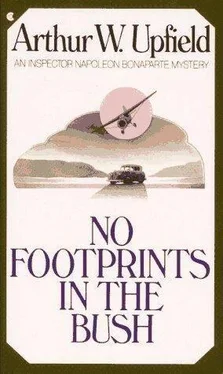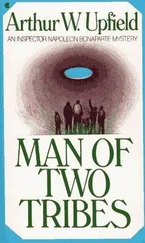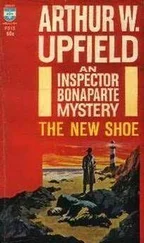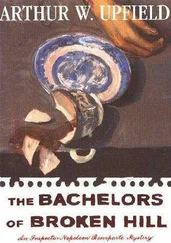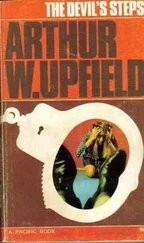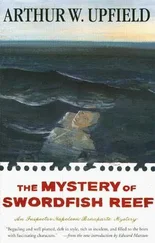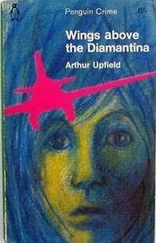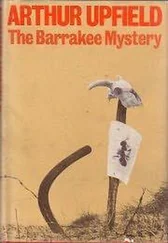Arthur Upfield - No footprints in the bush
Здесь есть возможность читать онлайн «Arthur Upfield - No footprints in the bush» весь текст электронной книги совершенно бесплатно (целиком полную версию без сокращений). В некоторых случаях можно слушать аудио, скачать через торрент в формате fb2 и присутствует краткое содержание. Жанр: Классический детектив, на английском языке. Описание произведения, (предисловие) а так же отзывы посетителей доступны на портале библиотеки ЛибКат.
- Название:No footprints in the bush
- Автор:
- Жанр:
- Год:неизвестен
- ISBN:нет данных
- Рейтинг книги:5 / 5. Голосов: 1
-
Избранное:Добавить в избранное
- Отзывы:
-
Ваша оценка:
- 100
- 1
- 2
- 3
- 4
- 5
No footprints in the bush: краткое содержание, описание и аннотация
Предлагаем к чтению аннотацию, описание, краткое содержание или предисловие (зависит от того, что написал сам автор книги «No footprints in the bush»). Если вы не нашли необходимую информацию о книге — напишите в комментариях, мы постараемся отыскать её.
No footprints in the bush — читать онлайн бесплатно полную книгу (весь текст) целиком
Ниже представлен текст книги, разбитый по страницам. Система сохранения места последней прочитанной страницы, позволяет с удобством читать онлайн бесплатно книгу «No footprints in the bush», без необходимости каждый раз заново искать на чём Вы остановились. Поставьте закладку, и сможете в любой момент перейти на страницу, на которой закончили чтение.
Интервал:
Закладка:
Arthur W. Upfield
No footprints in the bush
Chapter One
Mirage and Bombs
ONE of Nature’s oddities was the grove of six cabbage-trees in the dense shade of which Detective-Inspector Bonaparte had made his noonday camp. They grew beside an unmade road winding like a snake’s track over a range of low, treeless and semi-barren hills; and, so close were they, and so virile their foliage, that to step in among them was not unlike stepping into an ivy-covered church porch on a brilliant summer morning.
A more inviting place for a noon camp in late spring, away out on the edge of Central Australia, is seldom offered, and thankfully Bonaparte made a little fire within the shade and boiled water in his quart-pot for tea. With contentment bordering on ecstasy, he began to eat a lunch of damper and hard-boiled duck eggs whilst reclining against his swag.
Thus he was able to see a picture made extraordinarily vivid by the clear sunlight beyond the shade, a picture roughly framed in the shape of a Gothic arch. In the foreground of the picture passed the unmade road he had been following for four days. The road went on to fall sharply downward and skirt a hillside two hundred feet above a boulder-strewn gully. Beyond the hill it disappeared only to reappear on the side of yet another hill, beyond which it again vanished and reappeared before becoming lost amidst the tiny foothills washed by a still white mirage sea covering a valley ten miles across.
Beyond the mirage-covered plain could be seen the scrub on the distant higher land, scrub appearing to Bonaparte like an inch wide dark-grey ribbon supporting the northern rim of the burnished copper sky.
Four days earlier Bonaparte had left Shaw’s Lagoon, situated beyond Queensland’s western border, a very small township offering no excuse for its existence other than that it marked the terminus of a motor mail route. Shaw’s Lagoon was roughly eighty miles to the south-east of the cabbage-trees where he was now camped, and since he had passed through the gate in the State Border Fence he had passed through no other, had met no traveller, seen no house or hut. And now, down there on the plain, yet another twelve miles to walk to the McPherson homestead, could be seen the first hint of human life, the dust cloudraised by a moving vehicle.
Traffic on this road was rare. Eight days previously it had rained, and since then no wheel or hoof or human foot had marked it. It led to the Land of Burning Water, from which reports had drifted of strange happenings. There it lay beyond the hills, shimmering with yellow opalescence beneath the sun: burning water-the mirage.
From his high elevation on the edge of the hill range, Bonaparte idly watched the moving vehicle. On the basis of its speed, as indicated by the dust cloud it raised, he guessed it to be a car, and further, he guessed it was being driven by Sergeant Errey, as he was aware that the senior police officer stationed at Shaw’s Lagoon was visiting McPherson’s Station.
When the vehicle was hidden by the hills its progress still could be traced by the dust raised by its wheels, and presently it again appeared rounding a hillside, an ant running along an ant road. Calmly, and without haste, Bonaparte moved his body, brought the swag round to lie across his legs, and then began to remove the straps. It was certainly a car and the odds were in favour of its being driven by Sergeant Errey, for whom Bonaparte had a letter signed by the Chief Commissioner of the South Australian Police Department.
He had removed one strap, and his long fingers were engaged with the other, when with singular abruptness there burst into the silence about the camp the roar of an aeroplane engine.
Immediately following the arrival ofthis sound two crows, cawing in fear, almost fell into the branches of the cabbage-trees. Hidden from the man seated on the ground, they proceeded to vent their defiance on the plane, which passed over the camp, thence to follow the road to Shaw’s Lagoon.
Bonaparte did not see the machine. It had come from the west, possibly skirting the northern edge of the hill range. Had it come from the north or north-west, he could not have failed to see it in the picture framed within a leafy arch of Gothic type.
The sound of the aircraft engine had faded to a low buzz, but the crows in the branches above Bonaparte refused to leave, although they must have known he was not more than twelve feet beneath them. They continued their noisy defiance of the machine, which had been to them an even greater terror than a human being could be.
Bonaparte removed the letter from his swag and began itsrestrapping, his hands working automatically, his gaze directed at that part of the road where next the car would appear.
The car did appear, and at the same time Bonaparte heard the aeroplane returning. Its pilot could not be searching for a landing otherwise he would have selected the plain. He could hardly be lost, for there was the road to follow. The machine certainly had come from the west, yet westward stretched hundreds of miles of open semi-desert country, empty of settlement. Why fly in the direction of Shaw’s Lagoon for perhaps twenty miles, then turn and come back?
The frightened crows clung determinedly to their sanctuary. Bony lifted the swag from his legs to put it aside. His action was too much for the birds. They cawed and fluttered among the branches, but still were too frightened by the oncoming plane to leave. Theircawings were shut off by the thundering menace rushing towards them in their own element. They saw the vast hawk swooping upon their retreat, clung to the branches and shrieked defiance as it passed low above them. They saw the steel egg it dropped.
Fortunately for Bonaparte it was a small bomb. Fortunately for him, too, he was holding the swag in front of his body whilst seated on the ground. The bomb burst on the site of the now dead camp fire. Its explosion filled the shelter with dust and fumes, and sent outward steel fragments that lanced upward and severed leaves, to drop them through the dusty air.
Stunned by the noise, flung backward by the explosion, Bonaparte gasped in dust-laden air and fumes. His mind was divided: one part wildly angry because of the outrage, the other registering the fact that the crows had left their sanctuary, and fleeing as though pursued by ten thousand hawks. Twice the plane circled the grove of trees before flying on along the road to McPherson’s Station.
Bonaparte saw it for the first time when, having lurched to his feet, he peered with semi-blinded eyes along that same road. It was a monoplane, small, extremely fast, painted a silvery-grey. He saw, too, the oncoming car which now was less than half a mile away and traversing the steep hillside. The aeroplane was flying low to meet it, so low that its landing-wheels appeared to threaten the car.
Bonaparte saw the bombs drop-two of them. They fell together. The car, spurting red flame, gave birth to a growing ball of white smoke, and swerved off the road as though its driver was trying to escape the flame clinging to its roof. It ran up the hillside for several yards, then stopped and appeared to shrink inward into a heart of fire. The fiery heart rolled back to the road, rolled across the road, began to roll down the hillside, began to bounce as it gathered momentum. A central explosion increased the flames, and like a meteor it rushed down to the gully bed, where it lay and spouted upward a column of writhing black smoke. The aeroplane swooped and circled low over the burning wreckage. It bore no markings. There was only one man in it. His head could be seen behind the curved windshield. He was looking overside.
Within the black shadow cast by the cabbage-trees, Bonaparte crouched on hands and knees. Grey dust whitened his dark-brown face, rimmed his blue eyes, now brilliant and agate hard. The fine lips were drawntaut, revealing his white teeth in what was almost an animal snarl of fury. The zooming of the plane’s engine was distorted in his ears, still feeling the shock of the explosion. His hands rested on the ground and his fingers dug constantly into its softness.
Читать дальшеИнтервал:
Закладка:
Похожие книги на «No footprints in the bush»
Представляем Вашему вниманию похожие книги на «No footprints in the bush» списком для выбора. Мы отобрали схожую по названию и смыслу литературу в надежде предоставить читателям больше вариантов отыскать новые, интересные, ещё непрочитанные произведения.
Обсуждение, отзывы о книге «No footprints in the bush» и просто собственные мнения читателей. Оставьте ваши комментарии, напишите, что Вы думаете о произведении, его смысле или главных героях. Укажите что конкретно понравилось, а что нет, и почему Вы так считаете.
